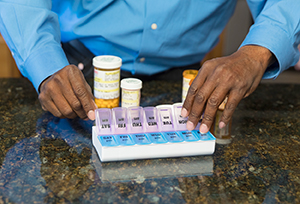After Kidney Transplant- Medicines
January 18, 2024Tags: nephrology, kidney transplant, kidney transplantation, kidney donor, kidney living donator, Self-care after kidney transplant, immune system after kidney transplant, rejection after kidney transplant, kidney transplant medication, side effect, after kidney transplant, renal, np1012a, Male, Female, Childhood (11 mo - 12 yrs), Teen (12 - 18 yrs), Adult (18+), Senior, Adult, Transplantation, Kidney
A transplanted kidney works like a normal kidney to filter your blood. You won't need dialysis if your kidney stays healthy. But you need to take medicines to keep your new kidney healthy.
Preventing organ rejection
Your body's immune system attacks foreign things like germs. Your immune system may attack your new kidney. This is because the new kidney is foreign tissue. This attack is called organ rejection. Medicines can help prevent rejection. You must take antirejection medicines for the rest of your life.
Treating organ rejection
Organ rejection is found and confirmed with a kidney biopsy. A small sample of kidney tissue is removed through a needle. Medicine is used to numb the area where the needle is placed. The tissue sample is checked in a lab by a pathologist.
If rejection does happen, treatment may stop it. If it can't be stopped, your new kidney will no longer work. You will then need dialysis to keep you alive. In time, you may be able to have a second kidney transplant.
Side effects of transplant medicines
Medicines to prevent rejection can have many side effects. The medicines weaken the immune system. You may get more infections. They may be more severe. You may also have a higher risk of some types of cancer. Talk with your healthcare provider about side effects and how to manage them.
Keeping your new kidney safe
-
Take your medicines as directed. If you don't, your new kidney will stop working. Then you will need dialysis again.
-
Use a pill box and electronic reminders so you don't forget any doses.
-
See your healthcare provider regularly for blood tests. These check how well your kidney and transplant medicines are working. Keep all of your follow-up appointments.
Working with your healthcare team
-
Talk with your healthcare team to make sure you understand your medicines.
-
Make sure you know all the instructions to keep your new kidney working right.
-
Write down any questions you have about your medicines. Bring them to your appointments.
When to call your healthcare provider
Call your healthcare provider right away for any of these:
-
Any kind of infection
-
Any new symptoms
-
Problems with your medicines
